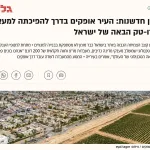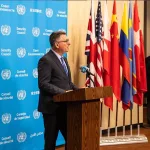Finance Minister Signs Drought Order Releasing Compensation Funds to Farmers
Israeli Finance Minister signs drought order to release compensation funds to farmers affected by severe weather conditions, focusing on specific crops and settlements. Period.
Jerusalem, 28 July, 2025 (TPS-IL) — Israel’s Finance Minister Bezalel Smotrich signed the 2024 drought order in light of the low rainfall last winter and the severe heat waves. The order was signed in cooperation between the Ministries of Finance and Agriculture and Food Security. The purpose of the order focuses on compensating agricultural growers whose crops were damaged last year, according to a list of settlements and agricultural crops.
The compensation is for the water costs of farmers who are on lists of specified settlements and agricultural crops, and were damaged as a result of weather hazards. According to the order, many areas in the north, the Jordan Valley and the south are defined as drought areas. In addition, the order applies to the following crops that were damaged last winter, which are: wheat, barley, clover, peas, sorghum, safflower, quinoa and oats.
The order applies to the areas and crops from June 1, 2024 to June 1, 2025. At the same time, and in light of the widespread crisis in all agricultural sectors following the drought, the Ministries of Finance, Agriculture and Food Security, and other parties are currently meeting to formulate a support outline for the remaining agricultural sectors that were affected and are not included in the order.
The severe water shortage is being felt in areas that have already been severely affected by the ongoing war, including areas in the Upper Galilee and the Golan Heights that are not connected to the national water system and depend mainly on natural sources, where a decrease of approximately 30% was recorded this year compared to last year.























